Stalled peace negotiation process and lack of political dialogue have now pushed back the country to where it has started in 2011. The then president Thein Sein offered an olive branch to the non-Bamar ethnic resistance groups to end the now more than seven decades of the civil war that has devastated Myanmar or Burma.

This happened due to the suspension of political dialogue between the 10 Nationwide Ceasefire Agreement-Signatory-Ethnic Armed Organizations, officially dubbed in abbreviation as NCA-S-EAO, since last November; the military (also known as Tatmadaw or Myanmar Army) continuation attitude of heavy-handedness, disruption and blockage regarding the EAOs’ meeting in Thailand recently; government and four-member ethnic military front, Northern Alliance-Burma (NA-B) problematic concerning bilateral ceasefire talks deliberation; and heightening Tatmadaw and Arakan Army (AA) armed conflict in Arakan state.
First, the suspension of the NCA-based peace negotiation process happened in November last year as the Karen National Union (KNU) and Restoration Council of Shan State (RCSS), the engine-head of the NCA-S-EAO, opted out of the official participation in the process citing unfairness and inequality in molding or going about with the implementation, including the difference of interpretation in the NCA between the government-military and the EAOs. To date, only unofficial interaction is still there, as official peace process that has begun since October 2015 has now virtually stopped.
The 21st Century Panglong-Union Peace Conference, which is supposed to draw up guiding principles for the future federal union formation and has to be conducted twice a year, could not be held almost a year now since July 2018.
Secondly, the military attitude of paternalistic and heavy-handedness disruption of ethnic political dialogue, gathering or public consultation, is a huge problem in peace-making and depleted the barely existing trust between the military and the EAOs. On many occasions, the Tatmadaw has stopped ethnic political consultation meetings among themselves for example in Shan and Arakan states, when actually it is supposed to be a peace negotiation partner on equal terms. But now it is like also playing referee in a match, where it is a contender, which literally means the playing field is not level and lopsided in the peace negotiation process.
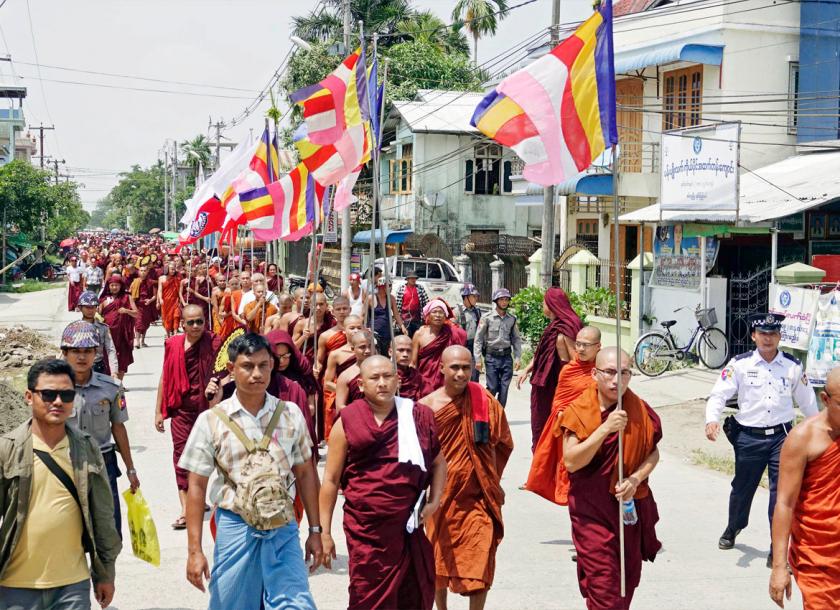
Very recently, the Tatmadaw disrupted the 10 NCA-S-EAO’s Peace Process Steering Team (PPST), its think-tank and negotiation organ, meeting from June 8 to 9 that was supposed to take place in Chiang Mai, Thailand. The Myanmar military attache reportedly asked its Thai counterpart to obstruct the meeting citing irregularity of the meeting, as NCA-non-signatory EAOs will participate, which is not conducive to the government’s preferred peace negotiation process. The signatories were irked by the military intervention arguing that the government also is meeting the non-signatories to support the whole peace process to be more inclusive and they are also just doing their bid, like the government.
Thirdly, there are problems where the government and NA-B bilateral ceasefire talk deliberations are concerned. The government National Reconciliation and Peace Center (NRPC) and the NA-B met in April and talked about bilateral ceasefire proposed by the latter. Earlier the government position was that the NA-B has to sign the NCA so that all its members could participate in the peace process as it is a precondition. But the NA-B proposed to sign the bilateral ceasefire first, followed by the amendment of the NCA that both sides could agree upon and sign it as a last step after all conditions are met. This was agreed by the government side, which the Tatmadaw reluctantly agree later.
At the present moment both parties are unable to agree on the meeting venue. While the government proposed big cities like Taunggyi, Lashio, Kengtung, Naypyitaw, Yangon and so on, the NA-B was said to propose Panghsang and Muse. But the inability to resolve the meeting venue until now is more of the lack of political will, as the Tatmadaw has repeatedly said that the AA stationing in Arakan state is not acceptable, which means even if bilateral ceasefire can be inked between the AA and Tatmadaw, it will only cover the portion of AA troops stationed in Kachin state and not its troops of some 3000 delivering hefty firefights with the Tatmadaw in Arakan state, since last year December.
Thus, it means the Tatmadaw is not keen to meet and possibly the AA may also be the same, as its main aim is to end the armed conflict in Arakan state and as well countrywide. This also brings the AA’s military alliance members of three, Kachin Independence Army (KIA), Ta’ang National Liberation Army (TNLA), and Myanmar National Democratic Alliance Army (MNDAA) or Kokang, to an awkward position to sign the bilateral ceasefire excluding the AA because of solidarity concern. In a nutshell, the bilateral ceasefire with the NA-B will be hard to materialize.
Fourthly and finally, the government and military policy to annihilate the AA at all cost, which has been made known time and again, is heightening the armed conflict.
According to the AA website the Tatmadaw suffered 88 casualties in January, 92 in February, 220 in March, 254 in April and 490 in May, totaling 1,144. On the other hand, director of the state counselor office Zaw Htay told the press conference in May that from January 1 to May 27, about 100 AA soldiers and 31 police had been killed and 48 AA soldiers had been captured. However, casualty figures of the Tatmadaw were not revealed.
Moreover, the government said from January through March, there were over 100 clashes between the two sides in Rakhine State, although the AA maintained that there were more than 200 in its website. Apart from that more than 40,000 people have been displaced because of the armed conflict in Arakan state.
Given such negative factors, the ongoing decades-old ethnic conflict doesn’t seem to be over anytime soon. The parliamentarians or MPs are impotent and not in a position to even debate about the civil war situation within the parliament, as the NLD-dominated government curtailed any proposal that has anything to do with the civil war. Observers concluded that the issue of civil war is conducted and implemented by the government and military bypassing the parliament which supposed to be representing the people’s voice. This argument is buttressed by the repeated statement made by Zaw Htay, director of the state counselor office, that the government see eye to eye with the Tatmadaw and endorsed its implementation in trying to subdue the AA, using every possible means of military capability, including helicopter gunships.
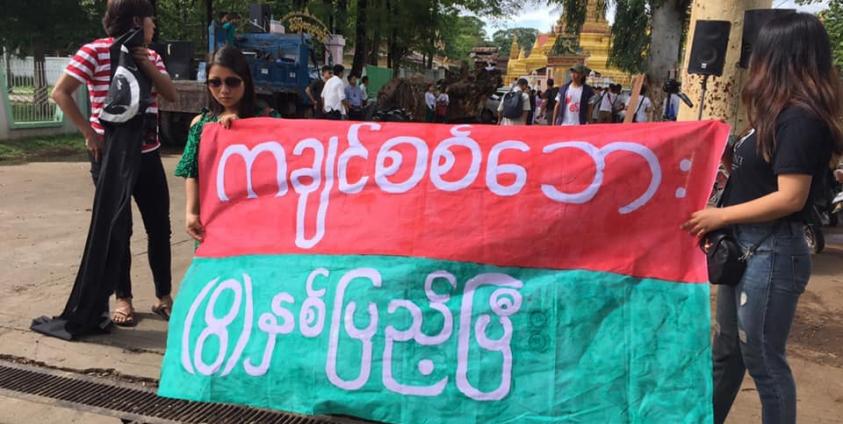
True, there have been anti-war movement in Kachin and Arakan states by the ethnic nationalities, sometimes allowed officially after lengthy procedure applying for permission and at times without permission, which mostly than were arrested or put on trial for breaching the rigid laws of peaceful public gathering.
In May last year some 300 staged anti-war, peace demonstration in Tamwe, Yangon to protest the ongoing war in the north of the country’s Kachin and Shan states. However, when police prevented some 300 people from marching they staged a sit-in, chanting anti-war slogans and waving light blue flags to symbolize peace. Some of the demonstrators were arrested and charged because they didn’t follow the peaceful assembly law, according to the police.
A few days ago, some 80 to 100 youths also staged an anti-war rally in Yangon but were dispersed shortly after by the authorities.
Thus, although awareness in ethnic states are high on the need to achieve peace and end the war, as they are directly suffering from the armed conflict raging in their midst, the majority of the people outside the conflict zones are largely unaware, save for some enlightened people and youths that sympathize with the ethnic people’s suffering and agony, including awareness of the indirect impact on the poverty of whole population because of the country’s under development due to decades of ongoing civil war.
Everybody knows that the human and material cost of the war is draining the country’s resources and the end of civil war is nowhere insight. The government and military seems to be on the warpath rather than peaceful negotiation, at least where the AA and Tatmadaw conflict in Arakan state is concerned. Besides, the NCA-based peace process is virtually dead and the parliament is practically impotent.
In such a situation, the recent urging of Radio Free Asia reporter Nay Raing Kyaw report directing its appeal to the people of Burma or Myanmar should be given a second thought, if this ongoing civil war is to end, once and for all.
“Because of this, the problem of civil war is the problem of the whole country. Instead of resolving it through (deliberation of) one person, one group or a small minority team, the problem should be speedily cleared (tackled) using the majority’s suggestion, with perseverance and transparency,” he eloquently said.
And to mobilize majority participation, instilling people’s awareness in realizing the agony of war that are going on in ethnic states and the need of peaceful atmosphere for national reconciliation and development of the whole country will be needed.
It is high time now that the civil societies and civilian-based organizations within the country to fill in this void and heighten the voice of the people to end the war and restore peace as soon as possible.






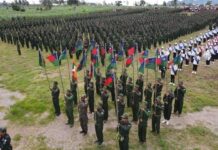
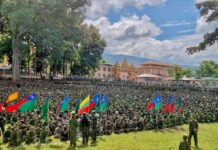
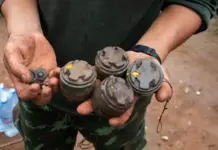
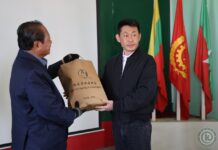

Leave a Comments